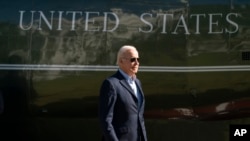The White House rolled out a long-delayed national security strategy on Wednesday that seeks to contain China's rise while reemphasizing the importance of working with allies to tackle challenges confronting democratic nations.
The 48-page document, which was delayed by the Ukraine crisis, includes no major shifts in thinking and introduces no major new doctrines for Biden's foreign policy. Instead, the document highlights the White House view that U.S. leadership is the key to overcoming global threats such as climate change and the rise of authoritarian regimes.
Even after the Russian invasion, China represents the most consequential challenge to the global order, it states. The U.S. must win the economic arms race with the superpower if it hopes to retain its influence across the world, it says.
“The People’s Republic of China harbors the intention and, increasingly, the capacity to reshape the international order in favor of one that tilts the global playing field to its benefit, even as the United States remains committed to managing the competition between our countries responsibly," national security adviser Jake Sullivan said in a preview of the policy on Wednesday.
Sullivan said the U.S. must manage the relationship with China while dealing with a set of transnational challenges that are affecting people everywhere, including climate change, food insecurity, communicable diseases, terrorism, the energy transition, and inflation.
Biden has yet to resolve some key foreign policy debates, including tariffs on Chinese goods established by his predecessor Donald Trump that cost U.S. importers billions, and faces new ones brought into high relief by Russia's actions, including fraying relations with long-time ally Saudi Arabia and India's reliance on Russian energy.
Sullivan echoed Biden’s comments from earlier in the week that the U.S. is "reevaluating" its relationship with Saudi Arabia after OPEC+ announced last week that it would cut its oil production target over U.S. objections.
The administration is supposed to send the strategy to Congress at the same time it submits its proposed budget. That happened on March 28.
Sullivan said the Ukraine crisis did delay but did not "fundamentally alter" Biden's approach to foreign policy. However, it did serve as a real-world example of the policy in action, he said.
"I do believe that it presents in living color the key elements of our approach – the emphasis on ally, the importance of strengthening the hand and the democratic world, standing up for fellow democracies and for democratic values.”







